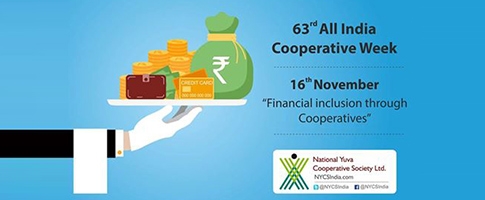Financial Inclusion Through Cooperatives
Financial Inclusion Through Cooperatives

What does Financial Inclusion Mean?
Financial inclusion is generally defined as the availability of banking services at an affordable cost to disadvantaged and low-income groups. In India the basic tool of financial inclusion is having a saving or current account with a bank. To achieve inclusive growth in the country, expanding the scope of financial inclusion initiatives like immediate credit facilities, insurance facilities, financial advisory services etc. to reach out to people at the grass-root level is instrumental. Access to affordable credit, cultivating the habit to save money and face to face financial advices are the most beneficial aspects of financial inclusion.
Financial inclusion is also critical for growth of the country. RBI has made compulsory plans to draw up financial inclusion for all the banks and made it mandatory to cover all the villages with a habitation of more than 2000 people. This not only will empower the people but also enhance market and business participation from many. Financial inclusion models should be designed to be at least self-supporting in the initial phase and profit-making in the long run. It is important to keep in mind that service provided should be at an affordable cost.
Financial Inclusion and Cooperatives
As remarked by Mr. Ban Ki-moon, the UN Secretary General, Cooperatives are a reminder to the international community that it is possible to pursue both economic viability and social responsibility. Experiences in the Developing nations like India have only reconfirmed the need for co-operative banking to bring about inclusion of this segment in the mainstream economy. They are root level organisations familiar to all, as they effectively operate public distribution system in each village of the country. Cooperatives are legally recognised institutions supported by governments. This legal backing is their main strength. They are exempted from taxes, stamp duties etc. Furthermore, they are offered with technical, financial and administrative assistance by the governments. This enables the cooperative businesses to generate the sufficient capital investments for their business operations.
Cooperatives have been revolutionary institutions in providing credit to farmers at a cheap rate and substituting the role of moneylenders and other non institutional supplies of credit from the rural scene. The development of cooperatives itself has been in leap and bounds through financial inclusion and vice versa.The cooperative bankers and micro financers can actually move in the field and meet people and analyse their needs and situations to then make and offer innovative products and services. Cooperatives can offer better integrated financial services to the poor men and women.
Measures To be taken by Cooperatives for Efficient Financial Inclusion
Cooperatives should analyse their working structure and reach to the unbanked population. Identifying the target groups and focusing on their needs of banking services should be the primitive responsibility. Access to banking could be the key to unlocking access to other financial services. Banking and micro credit services will help in instilling the habit of savings among these people. The saved money can serve as capital for a business or then simply enhance living standards.
Cooperatives can tie up with local NGO’s, Self Help Groups, Anganwadis etc. where the financially excluded can be easily tapped. Cooperatives should also try and cover the geographically remote areas where a scarce amount of bank branches work and people are deprived of the financial services.
Financial inclusion will act as a source of empowerment and allow people to participate more effectively in the economic and social process. Financial inclusion is a win-win opportunity for the poor, for the banks and for the nation. Cooperative Banks and micro finance institutions have a duty to rise up to meet these aspirations, convert the perceived weakness into exciting opportunities and facilitate inclusive growth.
NYCS JanaNidhi As A Cooperative Microfinance Agent
NYCS looks ahead for sustainable development of the country by launching income earning opportunities through self employment and entrepreneurship for youth, women and people from lower income group. Through its micro finance subsidiary JANA NIDHI actively works towards access to easy banking services, access to affordable credit and access to free face-to-face money advice in rural segments and more than 15000 families have benefited from it till now. Jana Nidhi facilitates deposit and loans to members to strengthen their financial conditions by providing small business loans upto rs. 25,000/- to the needy members. These are short term loans of one to fiev years to the young entrepreneurs and NYCS members by raising deposits from the general public. The nature of this business model has the elements of the functioning of a Self-Help-Group, Banks, Non-Banking Financial Institutions and Micro-Finance Institutions all mixed together for maximum benefits.
NYCS celebrated the 63rd All India Cooperative Week between 14th to 20th November. The date of 16th November had a theme dedicated to the topic financial inclusion through cooperatives. Under the leadership and guidance of Shri Satishji Marathe – President, Sahakar Bharati, Ex CEO – United Western Bank, Ex- Advisory Committee member to the Reserve Bank of India, NYCS Jana Nidhi started its first branch in Kerala in the year 2005-06 and today it has more than 20 branches across 6 States. We strongly believe that besides skill development, it will be necessary to provide Counseling, Financial, Institutional and Infrastructural support to the youth, in order to launch meaningful economic activities for gainful self employment.

